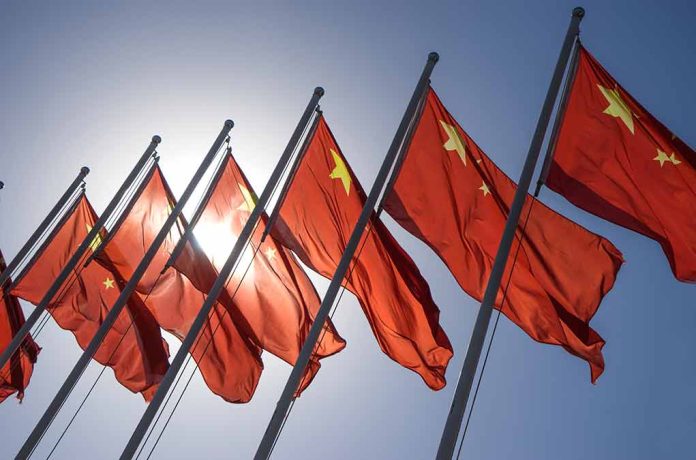
President Trump secures critical rare earth minerals from China in historic deal that levels the playing field with 55% US tariffs versus only 10% for China, while maintaining educational exchange.
Key Takeaways
- President Trump has finalized a preliminary trade agreement with China that ensures US access to essential rare earth minerals and magnets crucial for military production and national security.
- The deal establishes a significant tariff disparity, with the US imposing a 55% tariff on Chinese goods while China will implement only a 10% tariff on American products.
- China will continue to allow Chinese students to attend American colleges and universities, reversing an earlier stance on restricting educational access.
- The agreement addresses national security concerns as China controls 60% of global rare earth production and processes 90% of these critical materials needed for advanced military equipment.
- While awaiting final approval from both nations, the deal aims to reduce the $295.4 billion US trade deficit with China and establish mechanisms for ongoing trade discussions.
Trump Announces Breakthrough China Trade Deal
President Donald Trump has announced a groundbreaking trade agreement with China that addresses key national security concerns while maintaining a strong negotiating position for the United States. The preliminary deal, which requires final approval from both nations, focuses on securing reliable access to rare earth minerals and magnets that are essential for US military production. These materials are critical components in F-35 fighter jets, nuclear submarines, missiles, radar systems, and other advanced defense technologies that form the backbone of American military capability.
The agreement establishes a significant tariff disparity that strongly favors American interests, with the US implementing a 55% tariff on Chinese goods while China will impose just a 10% tariff on American products. President Trump emphasized the strength of the relationship despite the uneven tariff structure, noting on Truth Social: “WE ARE GETTING A TOTAL OF 55% TARIFFS, CHINA IS GETTING 10%. RELATIONSHIP IS EXCELLENT! THANK YOU FOR YOUR ATTENTION TO THIS MATTER!” said President Donald Trump.
China sets a six-month limit on rare-earth export licenses to U.S. manufacturers. In exchange, U.S. negotiators relaxed restrictions on jet engines and ethane. This temporary deal reflects the strategic leverage Beijing holds in the trade dispute.https://t.co/VvlJ9yQlHS
China…— Spotlight on China (@spotlightoncn) June 12, 2025
Strategic Access to Critical Minerals
The agreement directly addresses a critical national security vulnerability by ensuring American access to rare earth minerals that China has previously used as leverage in trade disputes. China currently controls approximately 60% of global rare earth production and processes an astounding 90% of these materials, creating a dangerous dependency for US defense capabilities. The deal specifically guarantees that “full magnets, and any necessary rare earths, will be supplied, up front, by China,” according to President Trump’s announcement.
“The United States is already on the back foot when it comes to manufacturing these defense technologies. China is rapidly expanding its munitions production and acquiring advanced weapons systems and equipment at a pace five to six times faster than the United States. While China is preparing with a wartime mindset, the United States continues to operate under peacetime conditions,” said Gracelin Baskaran, an analyst specializing in critical minerals and defense technologies.
This agreement represents a strategic victory for the Trump administration, which has consistently recognized the dangers of allowing China to monopolize these essential materials. By securing guaranteed access to rare earth minerals, the US can maintain its military readiness and technological edge without being subject to potential Chinese export restrictions during times of tension or conflict.
Educational Access Maintained
In a notable policy shift, President Trump has reversed course on an earlier position regarding Chinese students studying at American universities. The agreement now explicitly provides for continued Chinese student access to US educational institutions, which has been a longstanding economic and cultural exchange program. “WE WILL PROVIDE TO CHINA WHAT WAS AGREED TO, INCLUDING CHINESE STUDENTS USING OUR COLLEGES AND UNIVERSITIES (WHICH HAS ALWAYS BEEN GOOD WITH ME!)” Trump stated on Truth Social.
“This trade deal is a win for the United States, demonstrating President Trump’s unparalleled expertise in securing deals that benefit the American people,” said President Donald J. Trump.
While Commerce Secretary Howard Lutnick confirmed that the agreement is still awaiting final approval, stating, “We have reached a framework to implement the Geneva consensus and the call between the two presidents,” the groundwork has been laid for a trade relationship that strategically benefits American interests. The deal aims to address the substantial $295.4 billion trade deficit with China while establishing mechanisms for ongoing economic discussions between the two economic superpowers.
Economic Impact and Business Reactions
The high tariff rate of 55% on Chinese goods has generated mixed reactions from the American business community. Some business leaders have expressed concerns about potential price increases and supply chain disruptions. “A 55% tariff from China will substantially cause instability for consumer goods companies that are bringing goods in from China,” noted Bruce Kaminstein, a business leader with experience importing from China.
Walmart CEO Doug McMillon has indicated that the retail giant may need to adjust prices in response to the tariffs, stating, “Given the magnitude of the tariffs, even at the reduced levels announced this week, we aren’t able to absorb all the pressure given the reality of narrow retail margins.” Despite these concerns, the Trump administration has maintained that the economic benefits of a more balanced trade relationship with China, coupled with the national security advantages of securing rare earth minerals, outweigh potential short-term economic disruptions.
The agreement represents President Trump’s continued commitment to prioritizing American interests in international trade and ensuring that critical national security needs are addressed through strong, decisive negotiation with foreign powers. As the deal moves toward final approval, it stands as another example of Trump’s America First approach to foreign policy and trade relations.



